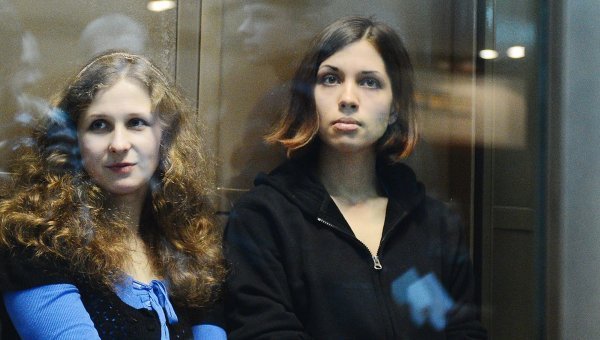MOSCOW, December 10 (RIA Novosti) – Jailed members of the Russian feminist punk protest group Pussy Riot appear to be eligible for release under the terms of a government amnesty that lawmakers started to consider Tuesday.
The amnesty, planned to mark the 20th anniversary of the introduction of Russia’s constitution, applies to people serving sentences of up to five years for non-violent crimes, and who have not previously served time in jail.
Maria Alyokhina, 25, and Nadezhda Tolokonnikova, 23, are serving two-year jail terms for hooliganism motivated by religious hatred for taking part in Pussy Riot’s brief “punk prayer” protest against President Vladimir Putin in a Moscow cathedral in 2012. Their conviction caused an outcry among human rights groups both at home and abroad.
The text of the amnesty conditions published on the website of the State Duma, the lower chamber of the Russian parliament, specifically lists mothers of underage children as being eligible for amnesty. Alyokhina and Tolokonnikova each have a child aged under seven.
The text of the amnesty, presented to the Duma by Putin for consideration, excludes those who have “deliberately violated the established terms of their punishment,” though it was not immediately clear what would constitute such violations. Alyokhina and Tolokonnikova, who deny their guilt, have both received reprimands while in jail that have been cited by judges in repeated rejections of parole appeals. Both women are due to be released next March.
Dmitry Vyatkin, deputy chair of the Duma’s constitutional legislation committee, said each case would be considered on an individual basis.
“People might not agree to be amnestied, if, for example, they don’t consider themselves guilty,” Vyatkin told RIA Novosti.
The publication of the conditions for amnesty shed light on the fate of several other high-profile prisoners or people facing charges in Russia.
The 30 people from 18 countries who were arrested by Russian authorities on board a Greenpeace ship after a protest against oil drilling in the Arctic in September are also eligible for pardon. They have been charged with hooliganism and are currently awaiting trial in St. Petersburg.
Former Defense Minister Anatoly Serdyukov, who has been charged with negligence amid a scandal over the misuse of state funds, is also eligible for amnesty.
The amnesty will not apply to all non-violent crimes, however. Opposition leader Alexei Navalny, who was given a suspended sentence this summer for large-scale theft in what critics said was a politically motivated case, will not see his conviction erased under the amnesty.
Yevgeniya Vasilyeva, the former Defense Ministry property department head charged over the illegal sale of government property, is charged with crimes including large-scale fraud and money laundering, which are not included under the terms of the amnesty.



